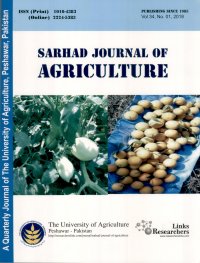Farm Record Keeping Behaviour of Rural Farming Youths in Ekiti State, Nigeria
Farm Record Keeping Behaviour of Rural Farming Youths in Ekiti State, Nigeria
Kemi Funmilayo Omotesho1*, Philip Akintunde Fatodu1 and Toyin Benedict Ajibade2
ABSTRACT
Poor record keeping among farmers in Nigeria greatly impedes the evaluation of the performance of farms, national planning, budgeting for commercial agricultural development, and control of postharvest losses. The study analysed the record keeping behavior of youth farmers in Ekiti State. Specifically, it assessed the level of record keeping among farmers; examined their attitude towards record keeping; assessed the farmers’ knowledge of record keeping; determined their intentions towards keeping farm records; and identified the constraints to farm record keeping. A three-stage random sampling technique was used to select 178 youth farmers on whom a structured interview schedule was administered. Data was analyzed using descriptive statistics and the Multiple Regression Analysis. Results reveal that most of the respondents were male (73.6%), with mean age of 28 years and average of 12 years farming experience. Farmers’ level of record keeping was low (Mean=2.26), and their attitude was poor (index=0.43). Farmers’ knowledge of record keeping was fair (index=0.66) while they had high intensions towards keeping records (index=0.77). Farmers’ overall behavior was fair (index=0.62) and determined by years of schooling (β=0.034) and age (β=0.013) at P<0.05. Poor understanding of the importance of record keeping (Mean= 3.48) and the fragmented nature of land holdings (Mean= 3.31) were the most severe constraints to record keeping. The study recommends increasing young farmers’ awareness regarding the benefits of record keeping and regular training particularly in the management of record keeping for multiple farm plots. Literacy programmes should also be organised to address deficiencies of poorly schooled youths.
To share on other social networks, click on any share button. What are these?







